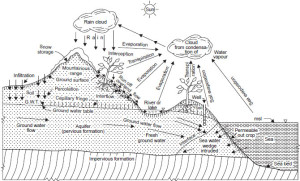Recently the sciences behind resource management also have come under the microscope as a result of exponential population growth. In my opinion, other than the sun, the most impotent resource we depend on is water. Hydrology is a branch of Geoscience (Earth Science/Environmental Science) concerning fluid dynamics specifically related to water.
It is a cycle
Like many things in science, in hydrology we can observe different processes and understand the relationships between them. With years and years of experience and wisdom, geo scientists have been able to create a blueprint for processes of water known as the hydrocycle (or water cycle).

Yes, this is an endless cycle. But, not all the fresh water can be sorted on the continental shelves. While the Earth is covered with a vast volume of water, most of it is not suitable for consumption. The energy required to remove salt from sea water for human consumption have outweighed the benefits. Even if the technology advance to reduce the cost of cleaning sea water, it is not a natural form of drinking water. In other words, the dependency on technology to provide us with the most basic needs is a not a far sighted strategy to combat resources scarcity. Now we know why hydrology is very important. Through the extensive study of principles of hydrology, we can build better system for water management.
We use it for…
The agricultural industry specially in South Asia heavily relied on complex system of water management and irrigation. Some techniques of hydrology can be dated back to as far as 2500 years. The dam building is a evolution of both Engineering and Geological achievements and failures. In the past we have made the mistake of underestimating the power of gravity driven flowing water. It has lead to catastrophes like Italian Val di Stava dam collapse. We learned from our mistakes and today we can build large dams to control massive volume of water such as the Three Gorges Dam in China.
Another application of hydrology (or rather hydro-geology) is the applications of underground water and brine management. Salt deposits for example provide economically valuable hydrocarbon reservoir. Salt structures are also a good option for storing radioactive waste. Salt behave like a fluid even though it is a solid. It can also also sustain considerable amount of shear and compressional forces without breaking apart. However it is weaken by fluids such as water and brine. This is where Hydro-geologists and Engineers have to work together to find a solution to the problem.
We can also utilize the knowledge on hydrology for other resources such as oil and gas. In fact due to the economic impotence of the petroleum industry, millions of dollars have been allocated to research in hydrology. The irony is while petroleum industry may have a significant negative impact on the environment, the industry have helped develop new techniques for fresh water management.
There are many other applications of hydro-geology. If you are interested in this kind of work, ask your professor for more information. Anyway, regardless of the new technologies we still use the simple fundamental principles which helped us understand the hydrological cycle.
References
1. Applied Hydrogeology (4th Edition) By C. W. Fetter